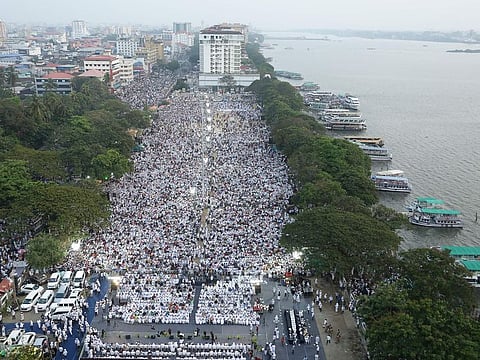CAA-NRC: Indian Muslims have broken the spell
BJP may have unwittingly led to the understated secularisation of Muslims

As the tail-end of the tattered year dragged itself into the burrow of eternity, a series of anti-CAA (Citizenship Amendment Act) and anti-NPR (National Population Register) saw Indian Muslims finally coming out and refusing to be mute or invisible.
The younger lot among them has no problem appearing on social media. Muslims of India have realised they can no longer hide and fight. In Delhi, for example, in the rally around the Jama Masjid, Muslim protesters held high in their hands copies of the Indian constitution that guaranteed them equality of rights in a secular republic. Hundreds waved the Indian national flag.
For close to seven decades since India’s Independence, the Muslim population of the country, except during the far and few between days of riots shied away from public display of their resentment. To a telling extent, they were dependent on political parties like the Indian National Congress or the various versions of the Muslim League to articulate their politics.
In November 2020, again, the important state of Bihar will be going in for the assembly polls. Here too, the minority politics will play a crucial role. If Delhi goes Kejriwal’s way, or if, for that matter, the Congress party marks a comeback, it will be a clear indication that the tide is beginning to turn against the BJPC.P. Surendran
The year-end protests indicate they no longer trust political parties to fully represent their grievances. It is equally possible that the political vacuum in India — the protests had no real leadership — by default eased the need for a new generation of educated and young Muslims to align with a political party.
Equally, the show of flags and the display of the copies of the Constitution while holding on to their custom (many wore burqa, for instance) could be interpreted as a secularisation of a minority rather famous for its allegiance to orthodoxy.
If sustained, this could be a significant development for the future. It also means that where the Congress Party, generally the vote-bank ally of the minorities, failed to convert the Indian Muslim into the mainstream, the BJP, seen as a polarisation force, by its trenchancy, has succeeded in bringing about an integration of sorts.
New-fangled secular streak
This paradox will keep the BJP on guard through 2020. In the state of Delhi, where a loose cannon like Arvind Kejriwal (Aam Aadmi Party — AAP) is in power as the chief minister for the last five years, the assembly election is due in January-end. Kejriwal, a bitter foe of Narendra Modi, is sure to exploit the new-fangled secular streak of young Muslims.
In November 2020, again, the important state of Bihar will be going in for the assembly polls. Here too, the minority politics will play a crucial role. If Delhi goes Kejriwal’s way, or if, for that matter, the Congress party marks a comeback, it will be a clear indication that the tide is beginning to turn against the BJP.
If this happens, it is not likely that Modi or Shah will go back on the back foot. All hard governments and strong states like to see their people in queues. In India, whether it was the demonetisation or the National Population Register, a queue defines the shape and structure of the State power.
A queue delineates, shores up the power on one side as the State, through a window where the line ends, decides if the man or woman is rewarded for his wait, for proving he is the subject of the State. The State gives, the subject receives.
Cause for queues
Modi’s government, therefore, is likely to give more cause for queues. A queue gives a sense of purpose, a sense of order, too. There is the hope of a goody at the end of it. A line is more comforting than a smudge, surely? And contrary to general expectation, the reasons for the queues will consolidate Hindu votes, and polarise people further. It is in this way that the BJP will hang on to power.
A war threat or a terrorist incident will fuel those consolidations. The year that went by was not a good one for the Indian economy. And it doesn’t look like revving up. In a poor-performing economy, then, the feel-good must be derived from a political or cultural impetus. What better than a sense of identity as a patriot or a Hindu? Or, increasingly, both.
I tend to see 2020 as an even more fraught year if only because there is no other way but confrontation for political parties to find a way forward. The silver lining is the understated secularisation of the Indian Muslim. And around this time next year, India just may have to thank the BJP for it.
C.P. Surendran is a senior journalist based in India.








